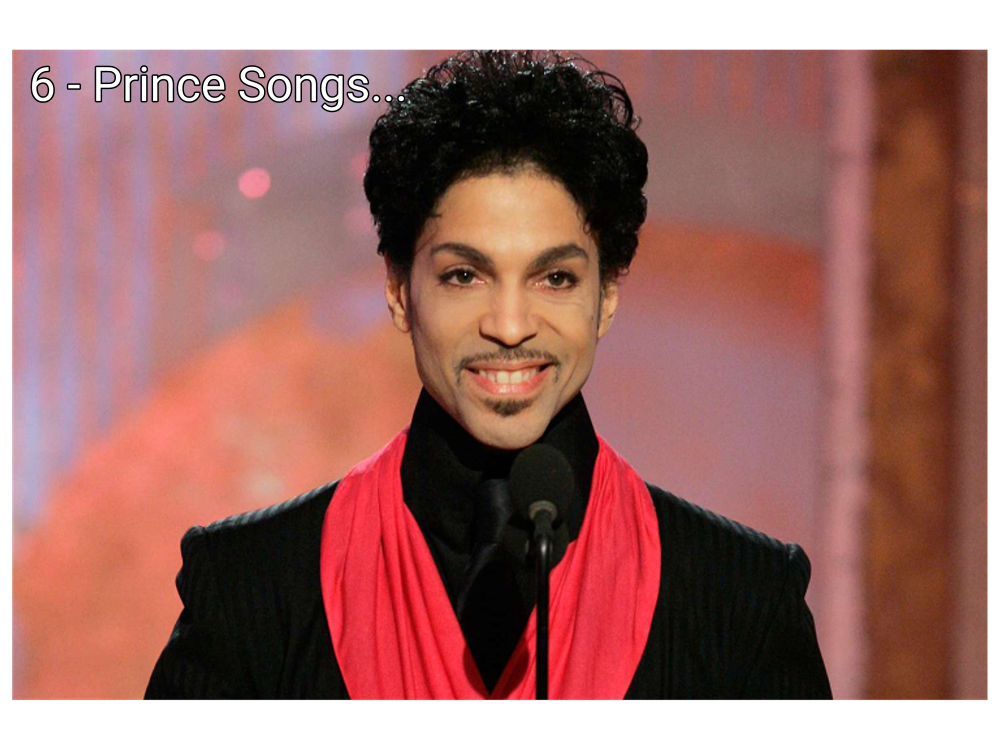(ThyBlackMan.com) Let me be honest with you—if you’re only listening to Prince’s biggest hits, you’re missing out on a whole universe of brilliance.
We all know the anthems: “Purple Rain,” “When Doves Cry,” “Let’s Go Crazy.” Those songs are legendary for a reason. But as someone who’s spent countless hours digging through his catalog, I’ve found that some of Prince’s deepest artistry is tucked away in the songs that never hit the radio or topped the charts. These tracks? They’re where the rawness lives. The experimentation. The real stories. The spiritual wrestling. The heartbreak.
So if you’re someone who appreciates layers in music—who loves the feeling of finding something rare and real—this list is for you. These six lesser-known Prince songs might not get the mainstream love, but trust me, they deserve your time and your ears. Whether you’re a lifelong fan or just now diving deeper into his catalog, you’re about to experience a side of Prince that’s intimate, fearless, and way ahead of its time.

1. “The Ballad of Dorothy Parker” (From Sign o’ the Times, 1987)
“The Ballad of Dorothy Parker” is a quirky, jazzy narrative that explores themes of desire, emotional detachment, and spiritual longing—all packed into an abstract storyline about a woman Prince meets at a restaurant. While the Sign o’ the Times album garners praise for several standout tracks, this particular tune often gets overshadowed. Yet, its stripped-down sound and offbeat storytelling set it apart as one of Prince’s most surreal and daring works.
What makes this song particularly special is how ahead of its time it was. Prince composed this track on a malfunctioning console that couldn’t properly convey high frequencies. Rather than postpone the session, he embraced the limitation. The result? A warm, underwater-like production that gives the song a moody, dreamlike quality. Dorothy Parker, the woman, becomes a metaphor for something Prince is chasing but can never fully grasp—be it love, intimacy, or salvation. The songwriting is playfully enigmatic. Prince doesn’t give you a traditional beginning-middle-end narrative. Instead, he throws you into a bizarre, whimsical interaction that feels more like a short film than a standard love song.
Even lyrically, there’s a quiet brilliance at work. Lines like “I said ‘Cool, but I’m leaving my pants on’ / She said ‘Baby, that’s cool, I’ll drive you home’” walk a fine line between humor and vulnerability, sex and subtlety. There’s flirtation, but also a sense of detachment—a portrait of two people connecting in a moment where they probably shouldn’t. Prince manages to make the mundane magical and the magical mundane, all while experimenting with the fusion of jazz, funk, and electronic minimalism.
Listening to this today, “The Ballad of Dorothy Parker” feels like something you’d find on a lo-fi jazz or alternative R&B playlist. It’s a genre-defying piece that manages to feel both retro and forward-thinking, a testament to Prince’s refusal to follow the rules. It’s music you can play while reflecting, reading, or just vibing through a rainy evening. The restraint in the production allows the storytelling and emotional subtext to breathe—making this track a true hidden gem in the Prince catalog that only gets richer with time.
2. “Hello” (B-side to “Pop Life”, 1985)
“Hello” is a B-side that Prince released in response to media criticism during the 1985 Live Aid concert, which he didn’t attend. It is often overlooked in the grand scheme of his discography, but those who find it are treated to a biting, funky protest track that proves Prince wasn’t just a musical genius—he was also socially conscious and fiercely unapologetic. While others might have issued a statement or done an interview, Prince did what he always did best: he went to the studio and told his side through music.
The song’s groove is infectious, filled with punchy bass lines, clapping percussion, and swirling synths—classic trademarks of mid-80s Prince. But the lyrics are where the real substance lies. “I tried to tell them that I didn’t want to sing / But I’d gladly write a song instead,” he states, pushing back against the notion that he should conform to industry expectations or public pressure. He didn’t see himself as a puppet for charity’s optics, especially when he had deeper critiques about the system and how music was being weaponized for performative virtue. This track has edge, attitude, and a real sense of Prince drawing a line in the sand.
There’s also a brilliant irony to the title “Hello.” While it sounds like an invitation, the message is anything but welcoming. It’s Prince essentially saying, “Hello? Are you listening?”—as he rattles off hypocrisies and refuses to be guilt-tripped into participation that didn’t align with his values. Today, in an era where artists are expected to be activists and weigh in on every issue, “Hello” feels more relevant than ever. It’s a declaration of artistic independence and an early example of Prince using music as a weapon against narrative control. It shows us that even in silence—or perceived absence—he was speaking volumes.
Turn this on when you need to be reminded that standing your ground doesn’t have to mean raising your voice—it can mean dropping a track. “Hello” is protest funk at its finest, filled with wit, purpose, and that unmistakable Minneapolis sound. The more you play it, the more you realize how masterfully Prince mixed commentary with groove. He didn’t just make a statement—he made a jam that hits just as hard today as it did in 1985.
3. “Something in the Water (Does Not Compute)” (From 1999, 1982)
Nestled within the critically acclaimed 1999 album is this emotionally raw, synth-heavy masterpiece. “Something in the Water (Does Not Compute)” isn’t as radio-friendly as its chart-topping siblings like “Little Red Corvette” or “1999,” but it’s arguably one of the most emotionally resonant tracks of Prince’s career. It’s dark, introspective, and filled with futuristic production that was way ahead of its time. This is Prince at his most vulnerable, using icy synthesizers and minimal instrumentation to explore the existential riddle of human relationships.
The track showcases Prince grappling with rejection, longing, and confusion. “You think you’re special—well, so do I,” he sings with a mixture of heartbreak and sarcasm. He’s not angry; he’s disoriented. The robotic drum patterns and ghostly synths evoke a sterile, disconnected atmosphere, like being trapped in a digital wasteland of your own emotions. It’s as if he’s trying to make sense of a love that doesn’t follow logical rules—a “glitch in the system” kind of pain that leaves him dazed and searching for answers.
What elevates this song further is its unorthodox structure. There’s no soaring chorus or obvious hook. Instead, Prince allows the mood to simmer, pulling the listener into his world of confusion. He resists resolution, both musically and emotionally, which only deepens the track’s impact. This isn’t the Prince of chart-topping ballads or seductive funk—it’s the Prince who lays in bed at night, wide awake, wondering why love hurts more than it heals.
Played through modern headphones or speakers, “Something in the Water” still sounds fresh, even prophetic. Its blending of new wave, electro-funk, and emotional transparency mirrors much of what we hear from today’s boundary-pushing artists. You can hear its DNA in The Weeknd’s icy heartbreak anthems, in the loneliness of James Blake’s vocals, and even in the quiet chaos of alternative pop acts like Billie Eilish. The beauty of this track lies in its refusal to offer closure. Prince doesn’t pretend to have the answers—he just knows something doesn’t compute. And somehow, that makes it even more human.
4. “Shy” (From The Gold Experience, 1995)
By the mid-90s, Prince was already at war with the music industry, famously changing his name to an unpronounceable symbol. This act of defiance was more than a publicity stunt—it was a protest against artistic exploitation. Amid this turbulent period, he released The Gold Experience, a critically underrated album that showcased his depth as a musician and philosopher. Nestled deep in this collection is “Shy,” a noir-esque track that merges folk guitar, spoken word, and bluesy funk in a way only Prince could pull off.
“Shy” tells the story of a woman who may or may not be involved in a murder, with Prince narrating the tale like a smooth-talking private investigator unraveling a mystery. There’s tension in the lyrics, but also sensuality—Prince masterfully balances suspicion and seduction. He doesn’t belt out the chorus like he would in “The Beautiful Ones” or “Adore.” Instead, he whispers, murmurs, and glides through the verses like smoke curling in the air. This vocal restraint adds an eerie intimacy, making the listener feel like they’re overhearing a confession rather than listening to a pop song.
What also sets “Shy” apart is its sonic minimalism. The fingerpicked guitar lays the groundwork, subtle and haunting, allowing Prince’s storytelling to take center stage. The track builds gradually, adding layers of background vocals and soft percussion that never overwhelm. It’s a moody and atmospheric experience—more arthouse than mainstream, more Raymond Chandler than Billboard. In today’s era of true crime obsession and ambient playlists, “Shy” feels remarkably current. It’s the kind of song you’d expect to find on a cinematic playlist or featured in a noir-inspired film. Prince proves once again that his reach as an artist wasn’t just about music—it was about crafting entire worlds in four-minute intervals.
5. “Colonized Mind” (From Lotusflow3r, 2009)
Released during Prince’s later years, “Colonized Mind” is part sermon, part psychedelic rock anthem, and all rebellion. By 2009, many had written Prince off as a legacy act—someone to be celebrated for past triumphs but no longer pushing the envelope. “Colonized Mind” shuts that notion down instantly. This is Prince at his most raw and reflective, combining searing guitar solos with heavy lyricism that examines political systems, psychological conditioning, and the theft of identity.
The title alone is powerful—“Colonized Mind” evokes images of mental slavery and societal control. Prince sings of people being taught to conform, manipulated by unseen forces that dictate how we think, live, and relate to one another. “Upload the evolution principle / You see a rock on the shore and say, ‘It’s always been there,’” he sings, critiquing the way power and history are rewritten by those in control. There’s a philosophical weight here that rivals his earlier political work like “Ronnie Talk to Russia” or “Sign o’ the Times,” but it’s couched in swirling guitar work reminiscent of Jimi Hendrix and Carlos Santana.
What makes this song especially poignant now is its relevance in the 2020s. In a world grappling with AI ethics, culture wars, disinformation, and systemic inequity, “Colonized Mind” plays like a warning we never heeded. Prince wasn’t just rocking out—he was documenting the psychology of oppression. The guitar doesn’t just sing; it screams in protest. The song is dense, powerful, and best appreciated with headphones on and eyes closed, allowing yourself to absorb every riff and revelation. It’s spiritual, political, and deeply human. If you’re in search of a track that blends intellect with soul, “Colonized Mind” is a potent elixir of both.
6. “Moonbeam Levels” (Recorded in 1982, released posthumously in Prince 4Ever, 2016)
“Moonbeam Levels” is perhaps one of the most cherished unreleased tracks among Prince fans, finally made available to the public in 2016 through the Prince 4Ever compilation. Recorded during the 1999 sessions, the song was inexplicably left off the final album, hiding away in the infamous Prince Vault for over three decades. When it finally surfaced, it was clear this wasn’t just an outtake—it was a spiritual, emotional, and musical gem that captured the very essence of Prince’s creative genius.
Musically, “Moonbeam Levels” contains everything fans love about early-80s Prince: shimmering synths, emotional vocals, and a guitar tone that floats like stardust. The arrangement is cinematic, bordering on symphonic, with soaring melodies that echo the grandeur of a space opera. Yet, for all its musical flourish, the track remains deeply intimate. It’s Prince dreaming aloud, imagining a place or frequency—”moonbeam levels”—where peace exists beyond pain, where spiritual rest exists beyond the chaos of everyday life.
Lyrically, the song is layered with both melancholy and hope. “There’s a man in a black car who’s trying to find peace of mind,” he sings. “Moonbeam levels—putting on a smile that’s always upside down.” There’s a sense of emotional exhaustion here, a desire to transcend earthly disappointments and float into something purer. The metaphors suggest a man who is tired but still believes in the possibility of something greater. And in hindsight, listening to this after Prince’s passing feels almost prophetic. He was always reaching for higher ground—both musically and spiritually.
In today’s world, where mental wellness, escapism, and the desire for healing are more prevalent than ever, “Moonbeam Levels” serves as a balm. It’s not a song for the dancefloor—it’s one for the soul. Whether you’re stargazing, soul-searching, or simply trying to make sense of life, “Moonbeam Levels” provides a beautiful, meditative escape. It’s Prince doing what he did best: bridging the spiritual and the sensual, the divine and the human. It may have taken decades for the world to hear it, but like a moonbeam cutting through darkness, its light is timeless.
The beauty of Prince is that even after all these years, you can still discover something new—some track, lyric, or guitar lick that hits different depending on where you are in life.
These six songs? They’re more than just “deep cuts.” They’re emotional portals, sonic experiments, and spiritual diaries. Each one shows a different side of Prince—the rebel, the philosopher, the hopeless romantic, the futurist. And honestly, that’s what makes revisiting his music so exciting. You never really finish listening to Prince. You just keep finding new corners of his genius.
So go ahead—cue up one of these songs tonight. Let it play while you unwind, journal, ride through the city lights, or just sit with your thoughts. Prince wasn’t just making music. He was creating moments, and even his hidden gems have the power to move you, challenge you, and maybe even change you. Don’t sleep on these. Press play—and listen closer.
Staff Writer; Jamar Jackson

















Leave a Reply